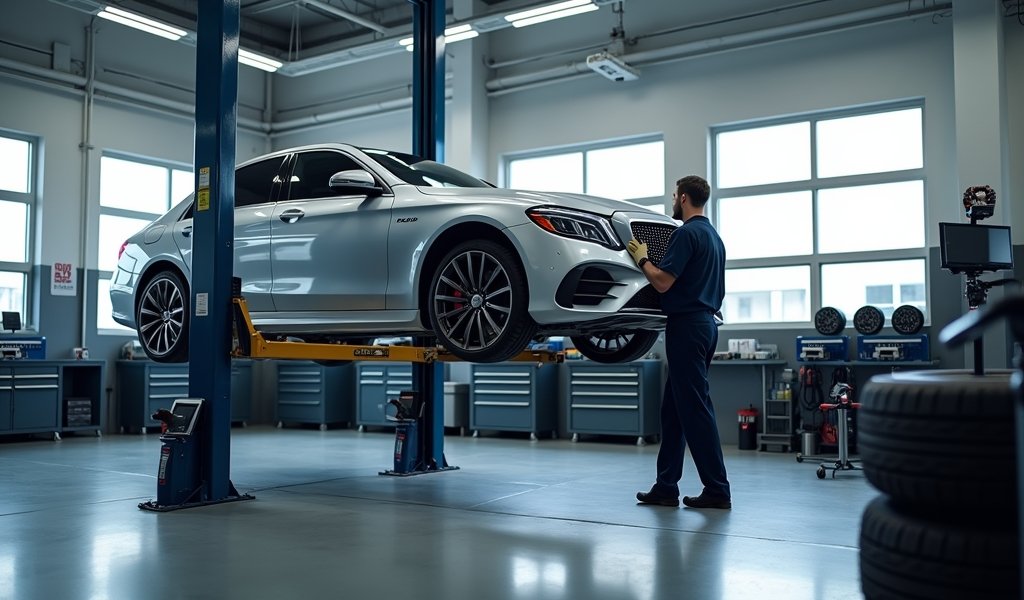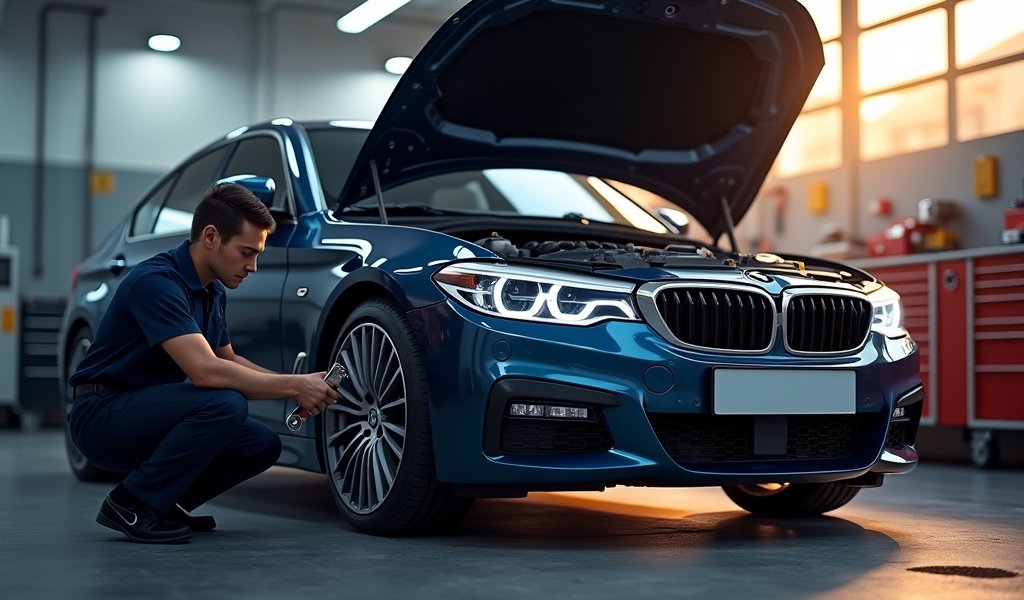Overview
This article explains why certified mechanics are essential for five critical car repairs: engine diagnostics, transmission service, electrical troubleshooting, brake system overhauls, and computer programming. It emphasizes that while DIY repairs might work for basic maintenance, professional expertise is necessary for complex fixes to ensure safety, proper diagnosis, and long-term vehicle health.
Table of Contents
- Why Certified Mechanics Matter: Experience You Can Trust
- Critical Fix #1: Engine Diagnostics and Complex Repairs
- Critical Fix #2: Transmission Service and Rebuilds
- Critical Fix #3: Electrical System Troubleshooting
- Critical Fix #4: Brake System Overhauls
- Critical Fix #5: Computer Programming and Module Updates
- Finding the Right Certified Mechanic Near You
- Conclusion: Your Vehicle Deserves Professional Care
- Frequently Asked Questions
When your car starts making that strange noise or a dashboard light suddenly illuminates, the question isn’t whether you need help—it’s who you should trust with your vehicle. As a mechanic with over 15 years under the hood, I can tell you that finding a certified car mechanic near me (or you) isn’t just about convenience; it’s about ensuring your safety and your vehicle’s longevity.
Today’s vehicles are sophisticated machines with complex computer systems and specialized components. While DIY fixes might work for simple maintenance, certain repairs absolutely demand professional expertise. Let’s break down the five critical fixes that require a certified mechanic’s specialized knowledge and equipment.
Why Certified Mechanics Matter: Experience You Can Trust
Before diving into specific repairs, it’s worth understanding why certification matters in the first place. Certified mechanics aren’t just people who enjoy tinkering with cars—we’re trained professionals who’ve dedicated years to mastering our craft.
ASE (Automotive Service Excellence) certification is the gold standard in our industry. To earn these credentials, mechanics must pass rigorous exams and demonstrate at least two years of hands-on experience. Many of us also hold manufacturer-specific certifications that require additional specialized training.
When you choose an ASE-certified mechanic, you’re getting:
- Technical expertise verified through standardized testing
- Up-to-date knowledge on the latest vehicle systems
- Commitment to ethical repair practices
- Access to specialized diagnostic equipment
- Professional warranty protection on repairs
According to the Bureau of Labor Statistics, professional automotive technicians complete extensive training and continuing education to keep up with rapidly evolving vehicle technology. This ongoing learning is something backyard mechanics simply can’t match.
Now, let’s explore the fixes where this professional expertise becomes absolutely essential.

Critical Fix #1: Engine Diagnostics and Complex Repairs
Your engine is the heart of your vehicle, and diagnosing engine problems correctly requires both expertise and specialized equipment that most DIY mechanics don’t have access to.
When your check engine light comes on or you notice performance issues, a certified mechanic brings crucial advantages to the table. We use professional-grade diagnostic scanners that go far beyond the capabilities of those $30 code readers from the auto parts store.
Here’s what a certified mechanic can diagnose properly:
- Misfires and internal engine problems
- Fuel delivery and injection issues
- Timing and valve train complications
- Oil consumption problems
- Cooling system failures
For example, if your vehicle is running rough, a basic code reader might show a “cylinder misfire” code. A DIYer might immediately replace spark plugs—but the actual problem could be a failing fuel injector, compression issues, or a vacuum leak. Certified mechanics follow systematic diagnostic procedures rather than the “parts cannon” approach of replacing components until something works.
I recently worked on a Toyota Camry where the owner had already replaced spark plugs, coils, and even injectors based on advice from online forums. Turned out, the issue was a tiny crack in the intake manifold causing a vacuum leak—something our smoke testing equipment identified in minutes.
Engine work also often requires specialized tools like compression testers, leak-down testers, and borescopes. These aren’t items most home mechanics have in their toolbox, and they’re essential for accurate diagnosis.
When dealing with engine issues, always seek out reliable car repair near me services with certified technicians. The cost of proper diagnosis is always less than unnecessary part replacements.
Critical Fix #2: Transmission Service and Rebuilds
If engines are the heart of your vehicle, transmissions are the central nervous system—complex, delicate, and extremely expensive to replace. When transmission issues arise, they demand a specialist’s touch.
Modern transmissions contain intricate hydraulic systems, electronic components, and precision mechanical parts. Even routine transmission service requires specific knowledge and equipment to perform correctly.
Signs you need a certified transmission specialist include:
- Delayed engagement when shifting into gear
- Strange noises like whining or clunking
- Slipping gears or unexpected neutral
- Burnt-smelling transmission fluid
- Warning lights for transmission temperature or function
Certified mechanics have access to transmission pressure testing equipment, specialized filter kits, and most importantly, the knowledge of exactly how much and what type of fluid your specific transmission requires. This last point is crucial—using the wrong transmission fluid can cause catastrophic damage.
For transmission rebuilds, the expertise gap widens even further. Certified transmission specialists understand the intricate assembly procedures and clearance specifications for different transmission types. They also have the equipment to properly clean and test components.
I once had a customer who attempted a transmission fluid change at home on his Honda Accord. He didn’t realize the specific procedure for filling CVT transmissions and ended up overfilling it by nearly a quart. The repair cost for the resulting damage was over $3,200—far more than a professional service would have cost.
For any transmission concern, finding quality affordable auto service with certified technicians should be your priority. The money you’ll save in avoided damage will far outweigh the service cost.
Critical Fix #3: Electrical System Troubleshooting
Modern vehicles are rolling computers. The average new car contains more than 100 million lines of code and dozens of interconnected control modules. When electrical problems arise, proper diagnosis requires both specialized knowledge and equipment.
Electrical issues are particularly frustrating because they’re often intermittent and difficult to trace. A certified mechanic brings both technical knowledge and systematic troubleshooting methods to these challenges.
Common electrical problems requiring professional expertise include:
- Battery drain issues that leave you stranded
- Erratic dashboard warning lights
- Malfunctioning power accessories
- Starting and charging system failures
- Complex sensor network problems
Certified mechanics use professional-grade equipment like digital multimeters, oscilloscopes, and manufacturer-specific diagnostic tools to pinpoint electrical problems. We also have access to factory wiring diagrams and technical service bulletins that identify known issues.
Consider this real scenario: A customer came in with a Chevrolet Malibu that would randomly not start. They had already replaced the battery, starter, and ignition switch based on parts store recommendations. Our technician used a lab scope to monitor the ignition circuit while reproducing the problem and found a failing body control module that was intermittently cutting power. This diagnosis required both specialized equipment and the knowledge to interpret complex electrical signals.
According to the Society of Automotive Engineers, electrical system complexity has increased exponentially in the past decade, making professional diagnosis more important than ever.
DIY electrical repairs often result in damaged components or dangerous short circuits. When dealing with your vehicle’s electrical system, always consult a certified professional.
Critical Fix #4: Brake System Overhauls
Your vehicle’s brake system is its most critical safety feature. While basic brake pad replacement might seem straightforward, complete brake system diagnosis and repair require professional attention.
Modern brake systems integrate hydraulic components with sophisticated electronic controls. Anti-lock brake systems (ABS), stability control, and emergency brake assist all rely on properly functioning sensors, control modules, and hydraulic units.
Warning signs that require a certified brake specialist include:
- Pulsation or vibration when braking
- ABS or brake warning lights on the dashboard
- Soft or spongy brake pedal feel
- Vehicle pulling to one side during braking
- Grinding or squealing noises beyond normal pad wear
Certified mechanics have the specialized tools required for complete brake service, including brake lathe equipment for resurfacing rotors, pressure bleeding tools, and scan tools that can activate ABS pump cycles for proper fluid exchange and bleeding.
Perhaps most importantly, certified technicians understand the torque specifications and proper assembly procedures for each component. Incorrectly torqued brake caliper bolts or improperly seated brake hoses can lead to dangerous failures.
I remember working on a vehicle where the owner had replaced their own brake pads but couldn’t figure out why the brakes were still making noise. Our inspection revealed they had installed the pads backward and damaged the rotors in the process. What should have been a simple pad replacement became a complete front brake overhaul.
When it comes to the system that stops your vehicle, never compromise on expertise. Your safety and that of others on the road depends on properly functioning brakes.

Critical Fix #5: Computer Programming and Module Updates
Perhaps the most technically demanding aspect of modern vehicle repair is programming and updating the various computer modules that control your car. This is an area where DIY repair simply isn’t possible without manufacturer-specific equipment and software licenses.
Modern vehicles contain up to 100 separate computer modules controlling everything from engine timing to door locks. These modules often require programming or updates when:
- Replacing major components like engines or transmissions
- Installing new control modules after failure
- Addressing performance issues or recalls
- Adding or replacing security components like keys
- Updating software to resolve known issues
Certified mechanics have access to manufacturer programming equipment that can cost tens of thousands of dollars. Many manufacturers require special security credentials and paid subscriptions to access their programming portals.
For example, replacing a simple body control module in many modern vehicles requires secure VIN programming that only authorized repair facilities can perform. Without this programming, components like power windows, remote entry, and even starting systems may not function.
I’ve seen numerous cases where customers attempted to replace modules themselves only to discover they couldn’t program them, leaving their vehicle inoperable and requiring towing to a professional facility.
According to Motor Magazine, vehicle programming requirements have increased dramatically in complexity, making professional service essential for these procedures.
When your vehicle needs component programming or software updates, always seek a certified professional with the correct equipment and training for your specific make and model.
Finding the Right Certified Mechanic Near You
Now that you understand which repairs demand professional attention, let’s talk about how to find a qualified certified mechanic in your area.
Start by looking for these credentials:
- ASE Blue Seal of Excellence recognition
- Manufacturer-specific certifications for your vehicle brand
- AAA Approved Auto Repair status
- Positive reviews specifically mentioning your type of repair
- Local Better Business Bureau rating
When evaluating potential shops, ask these key questions:
- What specific certifications do your technicians hold?
- Do you have experience with my make and model?
- What diagnostic approach would you take for my issue?
- Do you provide written estimates before beginning work?
- What warranty do you offer on parts and labor?
Be wary of shops that quote prices without proper diagnosis or push for additional services without clear explanations. A good certified mechanic will take the time to educate you about your vehicle’s needs and provide options at different price points when possible.
Also, consider checking services that connect customers with verified professionals or consulting a complete car service guide to understand what to expect during your repair.
Remember that the lowest price isn’t always the best value. Quality certified repair work might cost more upfront but saves you money in the long run through proper diagnosis, quality parts, and work done right the first time.
Conclusion: Your Vehicle Deserves Professional Care
Finding a certified car mechanic near you isn’t just about convenience—it’s about protecting your vehicle investment and ensuring your safety on the road. While DIY approaches work for basic maintenance, the five critical repairs we’ve discussed demand professional expertise:
- Engine diagnostics and complex repairs
- Transmission service and rebuilds
- Electrical system troubleshooting
- Brake system overhauls
- Computer programming and module updates
Today’s vehicles are technological marvels that require specialized knowledge, equipment, and training to repair properly. Certified mechanics invest years in developing their skills and thousands of dollars in professional equipment to provide the service your vehicle deserves.
Take the time to research and build a relationship with a certified professional you trust. Your vehicle—and your wallet—will thank you in the long run with reliable performance, fewer unexpected breakdowns, and lower overall maintenance costs.
Remember: When it comes to these five critical repairs, the right certified mechanic isn’t an expense—they’re an investment in your vehicle’s future.
Frequently Asked Questions
How do I know if a mechanic is truly certified?
Look for ASE certification patches on uniforms or certificates displayed in the shop. You can also verify credentials through the ASE website or ask to see technicians’ certification documentation.
How much more should I expect to pay for a certified mechanic vs. a non-certified one?
Certified mechanics typically charge 10-20% more than non-certified shops. The premium reflects their additional training, specialized equipment, and quality guarantees that often save money in the long run.
Can I trust the dealership service department for these complex repairs?
Dealership technicians usually have manufacturer-specific training ideal for computer programming and warranty work. However, independent certified shops often offer comparable quality for complex repairs at lower rates.
How often should I have my vehicle professionally inspected even if nothing seems wrong?
Most certified mechanics recommend professional inspections every 12 months or 12,000 miles, whichever comes first. Regular inspections can catch developing issues before they become expensive emergencies.
Is it worth getting a second opinion for an expensive repair quote?
Absolutely get a second opinion for any repair estimated over $500. Different shops may have varying approaches, and a second certified mechanic might identify a more cost-effective solution.


Pingback: Car AC Repair Service: 7 Proven Tips - knowsyourcar.com
Pingback: Transmission Repair Service: Quick Guide - knowsyourcar.com
Pingback: Mobile Car Mechanic Near Me: Top 5 Fixes - knowsyourcar.com
Pingback: Certified Car Mechanic Near Me: 10 Tips - knowsyourcar.com